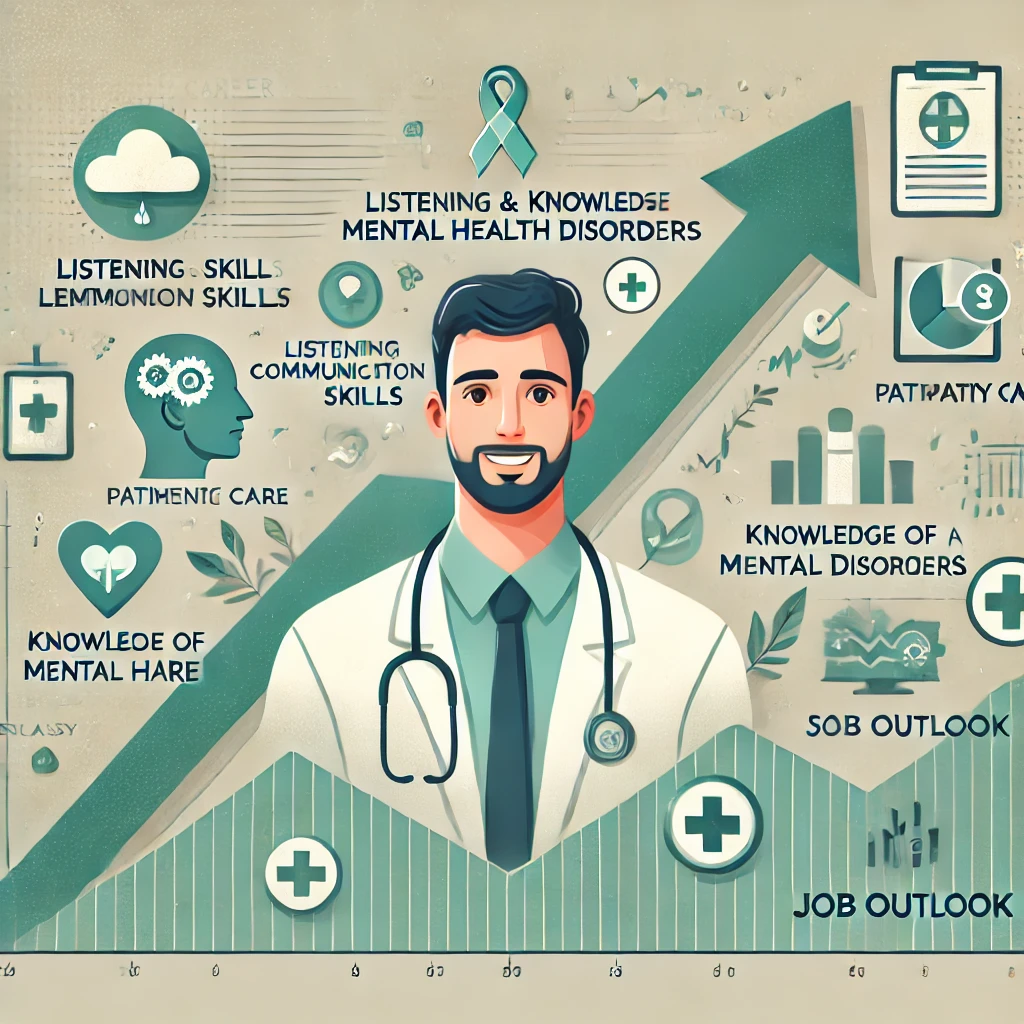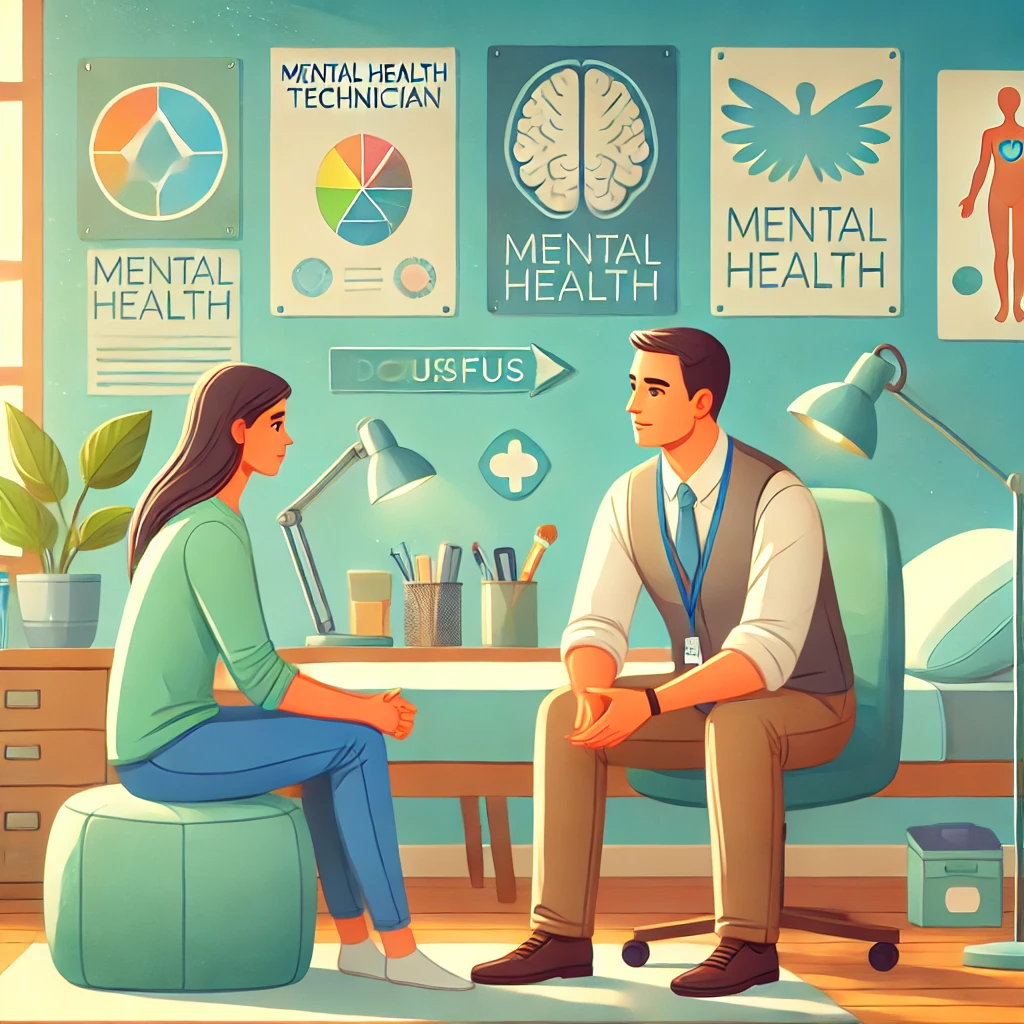Introduction: Understanding the Role of a Mental Health Technician
In the ever-evolving healthcare industry, mental health care has emerged as a critical focus. Mental health technicians, often referred to as psychiatric technicians or behavioral health technicians, play an essential role in providing direct care and support to individuals facing mental health challenges. This article will explore what a mental health technician does, the skills and qualifications required for the role, career prospects, and how to pursue a career in this rewarding field.
The role of a mental health technician is integral to the treatment and care of patients in psychiatric facilities, hospitals, rehabilitation centers, and other mental health environments. These professionals work under the supervision of mental health professionals like psychiatrists, psychologists, and social workers to ensure that patients receive the appropriate care and treatment.
1. What Does a Mental Health Technician Do?

Mental health technicians are trained professionals who assist in the day-to-day care of patients with mental health disorders. They provide support in a variety of settings, including inpatient psychiatric hospitals, outpatient clinics, residential treatment facilities, and rehabilitation centers. The core duties of a mental health technician include:
A. Patient Monitoring and Support
One of the primary responsibilities of a mental health technician is observing and monitoring patients. This includes keeping track of patients’ behaviors, symptoms, and progress throughout their treatment. Mental health technicians are often the first to notice changes in a patient’s condition, and they report these changes to psychiatrists and therapists.
B. Assisting with Therapy and Treatment
Mental health technicians assist patients during therapy sessions, helping them feel comfortable and engaged. They may assist in group therapy, provide emotional support, and encourage patients to participate in their treatment plans.
C. Administering Basic Care
Mental health technicians also help patients with basic care needs, which may include assisting with daily living activities (ADLs), such as eating, dressing, or grooming. They may help patients manage medications and ensure they follow their prescribed treatment plans.
D. Crisis Intervention
In high-stress situations, mental health technicians play a critical role in de-escalating crisis situations. They are trained in techniques to manage aggressive or violent behavior and ensure the safety of patients and staff. Mental health technicians work closely with other healthcare professionals to manage emergencies effectively.
E. Documentation and Reporting
Accurate documentation is essential in healthcare, and mental health technicians are responsible for maintaining detailed patient records. This includes documenting behavioral changes, treatment responses, and any incidents that occur during their shifts. Clear, concise reporting ensures that the care team stays informed and can adjust treatment plans as necessary.
2. Required Skills and Qualifications
Becoming a mental health technician requires a combination of formal education, hands-on training, and key personal traits. The following skills and qualifications are essential for success in this role:
A. Education and Training
Most mental health technicians are required to have at least a high school diploma or equivalent, though many positions prefer candidates with an associate’s degree in psychology, social work, or a related field. Some employers may require additional certifications or specialized training in mental health care.
- Certification Programs: Various certification programs, such as the Certified Psychiatric Technician (CPT), provide essential knowledge and training for aspiring mental health technicians. These certifications demonstrate proficiency in the field and can help boost job prospects.
- On-the-Job Training: Many mental health technicians receive on-the-job training, which includes learning crisis management techniques, patient communication skills, and how to use specific healthcare tools.
B. Essential Skills
Mental health technicians must possess a variety of skills, including:
- Communication Skills: Mental health technicians need to communicate effectively with patients, families, and other healthcare providers. Strong verbal and written communication skills are essential for documenting patient progress and participating in team meetings.
- Empathy and Compassion: Working with individuals facing mental health challenges requires empathy and compassion. Mental health technicians must be able to relate to patients, offer emotional support, and help them feel valued and understood.
- Patience: Dealing with individuals experiencing mental health crises requires patience and understanding. Mental health technicians must be able to handle challenging behaviors calmly and professionally.
- Physical Stamina: The role of a mental health technician can be physically demanding, especially in facilities where patients may require physical assistance or where crisis interventions are necessary.
- Problem-Solving Skills: Mental health technicians must be able to think critically and solve problems quickly, especially when dealing with emergencies or managing challenging patient behaviors.
C. Additional Certifications
While certification is not always required, many mental health technicians choose to pursue additional credentials to advance their careers:
- CPR and First Aid Certification: Mental health technicians are often required to have CPR and first aid training to handle emergencies that may arise with patients.
- Crisis Intervention Training (CIT): This specialized training teaches mental health technicians how to respond effectively to patients in crisis situations.
3. The Difference Between a Mental Health Technician and Other Healthcare Roles
Mental health technicians play a distinct role in the healthcare system, but their duties sometimes overlap with those of other mental health professionals. Here’s how they differ from similar positions:
Mental Health Technicians vs. Psychiatric Nurses
While both mental health technicians and psychiatric nurses work with individuals with mental health conditions, psychiatric nurses generally have more advanced medical training. Psychiatric nurses are registered nurses (RNs) who can prescribe medications, administer treatments, and manage patients’ overall health, while mental health technicians focus more on patient monitoring and emotional support.
Mental Health Technicians vs. Psychiatrists and Psychologists
Psychiatrists and psychologists are licensed professionals who diagnose and treat mental health disorders. While mental health technicians may assist in the treatment process by providing support and observing patients, psychiatrists and psychologists are responsible for developing and implementing treatment plans. Mental health technicians do not diagnose or prescribe medication.
Mental Health Technicians vs. Social Workers
Social workers in mental health settings typically help patients and families navigate the healthcare system and access social services. They may provide counseling and advocacy, whereas mental health technicians focus on providing hands-on care and assisting patients with daily activities.
4. Career Outlook and Opportunities
The demand for mental health technicians is growing, driven by increased awareness of mental health issues and the need for specialized care in hospitals, clinics, and rehabilitation centers. According to the U.S. Bureau of Labor Statistics (BLS), employment for psychiatric technicians is projected to grow by 11% from 2021 to 2031, which is faster than the average for all occupations.
A. Job Opportunities
Mental health technicians can work in a variety of settings, including:
- Hospitals: Many mental health technicians are employed in psychiatric hospitals, where they provide care to individuals with severe mental health disorders.
- Residential Treatment Facilities: These technicians assist in long-term care settings, providing daily support and monitoring for patients with chronic conditions.
- Outpatient Clinics: Mental health technicians may also work in outpatient clinics, where patients visit for therapy and treatment but do not require hospitalization.
- Community Mental Health Centers: These centers provide essential care to individuals in need of support, and mental health technicians assist with ongoing treatment plans.
B. Career Growth
Mental health technicians have the opportunity to advance in their careers by gaining experience, pursuing additional certifications, or specializing in areas like crisis intervention or geriatric mental health. Some may move into roles such as mental health counselors, case managers, or even healthcare administrators.
5. How to Become a Mental Health Technician
Becoming a mental health technician involves a few key steps:
- Obtain a High School Diploma: A high school diploma is the minimum requirement, but pursuing higher education in psychology or a related field can improve job prospects.
- Enroll in a Certification Program: While not always required, completing a certification program, such as the Certified Psychiatric Technician (CPT), can enhance your credentials.
- Gain Experience: Most employers prefer candidates with hands-on experience, which can be gained through internships or entry-level positions in healthcare settings.
- Pursue Advanced Training: For those interested in advancing their careers, additional training in areas such as crisis intervention or behavioral therapy can provide more opportunities.
Conclusion: A Rewarding Career in Mental Health
Mental health technicians play an essential role in the healthcare system, helping individuals manage their mental health and navigate their treatment plans. By providing direct patient care, monitoring behaviors, and supporting mental health professionals, they help create a positive impact on patients’ lives. With growing demand for mental health services and increasing recognition of mental health care’s importance, becoming a mental health technician offers a rewarding career path. Whether you are just starting your career or looking to specialize further, this field offers ample opportunities to make a meaningful difference.



